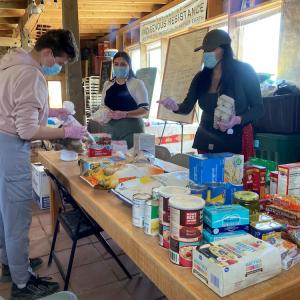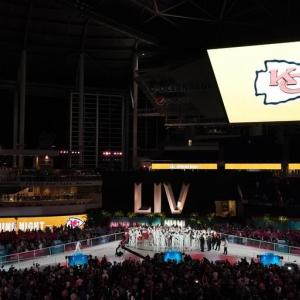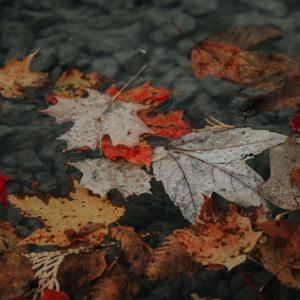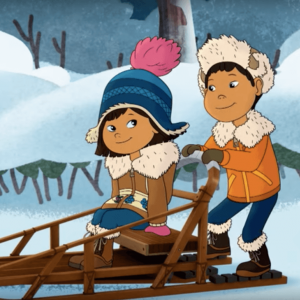
Kaitlin Curtice is a Native American Christian author and speaker. As an enrolled member of the Potawatomi Citizen Band and someone who has grown up in the Christian faith, Kaitlin writes on the intersection of Indigenous spirituality, faith in everyday life, and the church.
Her new book NATIVE (available May 2020) is about identity, soul-searching, and being on the never-ending journey of finding ourselves and finding God. As both a citizen of the Potawatomi Nation and a Christian, Kaitlin Curtice offers a unique perspective on these topics. In this book, she shows how reconnecting with her identity both informs and challenges her faith. Her first book, Glory Happening: Finding the Divine in Everyday Places, was published with Paraclete Press in 2017. It is a series of fifty essays and prayers focusing on finding the sacred in everyday life.
Kaitlin has contributed to OnBeing, Religion News Service, USA Today and Sojourners, among others, and she was interviewed for the New Yorker on colonization within Christian missions. In 2018 she was featured in a documentary with CBS called “Race, Religion and Resistance,” speaking on the dangers of colonized Christianity.
Kaitlin travels around the country speaking on faith and justice within the church as it relates to Indigenous peoples. She has been a featured speaker at Why Christian, Evolving Faith, Wild Goose Festival, The Festival of Faith and Writing, and more.
She also occasionally writes at her blog, kaitlincurtice.com.
Posts By This Author
A Prayer for a Violent Nation
We are so troubled.
We are the ones in denial of our violence
and we are the ones who are crying out for justice.
Can you feel us shaking?
Lessons in Belonging from Indigenous Leaders
COVID-19 America has revealed how young it is — that we are a nation still struggling to grow up and figure out who we are. The daily news bears this out.
Holding Solidarity Amid Collective Grief
In this global COVID-19 pandemic, we are reeling from individual and collective grief. We are trying to figure out what life looks like on the other side, hoping for something “normal” but unsure of what that even means.
Turning to the Arts in Times of Chaos
In the midst of this coronavirus pandemic, I find myself waking up in the morning longing for something that will make me feel alive and tethered to hope. I scan my bookshelves for something that will remind me to keep going. I listen to music that helps me stay grounded and secured to goodness. We watch shows as a family and play board games so that we can laugh. We go on walks and chase the dogs in the back yard because we are trying to do this the best we can.
We Can Do Hard Things and Survive, Together
America is fighting to figure out who we are. We are unmasking terrible truths, coming to terms with racist and oppressive ideals that have long been part of our foundations, and asking what change is supposed to look like.
How to 'Try Softer': A Conversation with Aundi Kolber
Recently I had the opportunity to read Aundi Kolber’s newest book, Try Softer: A Fresh Approach to Move Us out of Anxiety, Stress, and Survival Mode — and into a Life of Connection and Joy. The book quickly became a regular part of my self-care routine. Aundi is a licensed professional counselor and public speaker, and her work reflects the gentleness that so many of us need in a time in America when we are all a little (or a lot) frazzled by the social, political, and religious climate around us. We need books that help keep us tethered to the work of self-care so that we can do healthier work in the world. Try Softer is a book that can get us there.
The Super Bowl Is Over. The Discrimination Indigenous Peoples Face Is Not
Like other teams that have mascots that they claim “honor” Indigenous peoples, many Chiefs fans proudly sport their headdresses and tomahawk chops, perpetuating the stereotypes that we are primitive people who either no longer exist or only exist as savage warriors.
Embracing the Beautiful and the Terrible in 2020
“Here is the world. Beautiful and terrible things will happen. Don't be afraid.” —Frederick Buechner
It’s barely 2020, and we are already reeling, if not personally, collectively. Twitter feeds are full of Iran-related retweets of the president, when just weeks ago we were talking about impeachment.
Who Will Light Our Way into the New Year?
Who are the lamplighters of our time, the ones lighting the dark paths we are journeying? What do they have to teach us about keeping up hope?
Engaging in the Hard Work of Community This Thanksgiving
When we’ve decided to call ourselves woke, we are disregarding the journey of becoming woke along the way. When we say we are already decolonized, we are neglecting the seriousness of the journey toward decolonizing in all its complexities.
What Is Our Work in the Face of Empire?
Our greatest prophets took the time to ask that question often, and we can follow in their footsteps.
If the Earth Keeps Dying and Creating Again, Then Maybe We Can Do the Same
A few days ago, my son started a science journal to write down questions and answers about why certain things happen in the natural world. His first question was: Why do leaves change color in autumn?
A Shared Vision of Contemplative Activism
Contemplatives are people who seek the whole, and therefore, live in liminal spaces. So, what then does it look like for us to come up against systems that oppress? We stand against those systems, not because we are looking for a good versus evil duality, but because we recognize that oppressive systems do not see the whole, they themselves are working in dangerous dualities that dehumanize.
The Sacredness of the Earth as She Is
As we continue to enter deeper into the crisis of climate change, into the reality of human rights abuses and eruptions of violence happening not just here but all over the world, perhaps we need to take a different approach in our relationship to one another and our creature-relatives all over the earth.
Molly of Denali and the Power of Indigenous Representation
A few days ago, I gathered with my two Potawatomi sons on our couch to watch Molly of Denali, a cartoon that recently premiered on PBS starring a young girl named Molly who is an Alaska Native (specifically, Gwich’in/Koyukon/Dena’ina Athabascan). This show is the first of its kind in the history of the United States.
Why We Need Women to Lead Us
In some ways, that conversation continues to change as we work through issues of inequality. In a world in which the U.S. women’s team wins the World Cup, we still fight for equal pay, for recognition. In the church, it’s a constant uphill battle to get people to respect women as much as men, and while the conversation makes a lot of people uncomfortable, we are still having it. I wouldn’t know how to begin these conversations if I hadn’t encountered the leadership of women in the church.
A Crucial Piece Missing in the Democratic Presidential Debates
I watched both of the Democratic presidential debates over the last two nights, waiting to see if anything related to the invisibility of Indigenous peoples would somehow make its way into the conversation. I didn’t expect it to, of course; in a nation that does not even begin its events with a land acknowledgement (like Canada, Australia, and other nations do), why would we expect that the experiences of the original peoples of this land would come into a debate when each candidate only has a limited time to respond?
The Long Haul of Justice
As I was growing up in an evangelical church, one of my pastors’ favorite scriptures to use to wake up a congregation and remind us to keep going was the “run-the-race” scripture. In Hebrews 12, we are instructed to “run with perseverance the race marked out for us, fixing our eyes on Jesus, the pioneer and perfecter of faith.” But I was never a runner — or, in fact, had any athletically inclined bone in my body — and I desperately needed a different metaphor, something that I felt would teach me to carry on my faith in a sustainable way.
In Collective Grief, What Does Our Humanity Require of Us?
We continually ask, as Christians, what it looks like to embody a Christ who is both risen and stoops down to rip his clothes in lament that things are not as they should be in this world. It is the Easter season, and yet, we mourn.
What Can Spring Teach Us About Our Own Healing?
Spring is here once again, and we are watching elements of nature in America slowly come alive as the last hints of winter melt away one day at a time. One of the most incredible things we can learn from the earth is the importance of seeing everything in cycles.



















